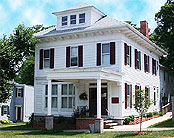Ghost Hunting and Paranormal Terms
Afterlife - One of several terms used interchangeably to refer to life after death. The word "afterlife" has been used since 1615, and is generic enough to use in almost any setting and culture. Other terms include "crossing over," "the Otherworld," and "the other side." Most ghost hunters avoid specific religious terms such as "heaven" when discussing ghosts, hauntings, and an afterlife.
Anomaly - Something that is out of place and unexplained. In paranormal studies, it refers to any phenomena that we cannot explain. Example: A lens flare in a photo is not an anomaly, but an orb that we cannot explain is an anomaly.
Apparition - Since the early 17th century, this refers to any ghost that seems to have material substance. If it appears in any physical form, including a vapor-like image, it may be called an apparition.
Clearing, or space clearing - Ridding an area of lingering unpleasant energy. It does not "kill" a ghost. Space clearing may encourage ghosts to cross over, or at least leave the haunted location.
Demons - Historically, this term has included deceased individuals. However, since the early 18th century, it usually refers to an evil spirit, sometimes more powerful than man, but less than Deity. Today, we generally do not use this term to indicate a deceased human being. The female demon, very rarely mentioned, is a demoness.
Ectoplasm - Often referred to as "ecto," this is the physical residue of psychic energy. It's the basis for "slime" used in the Ghostbusters movies. Ectoplasm can be seen by the naked eye, and is best viewed in dark settings since it is translucent and tends to glow. It is very unusual.
EMF - Electro Magnetic Field, or Electro Magnetic Frequency. As the name suggests, it's a combination of electrical and magnetic fields. You'll find high EMF levels around power sources, fuse boxes, electrical outlets, computer monitors, microwave ovens, etc. Unexplained EMF fields often indicate something paranormal. EMF fields can be measured with various tools, including an EMF meter or a hiking compass.
Entity - Any being, including people and ghosts.
EVP - Electronic Voice Phenomena, or the recording of unexplained voices, usually in haunted settings.
Ghost - A sentient entity or spirit that visits or lingers in our world, after he or she lived among us as a human being. We've also seen evidence of ghostly animals and pets.
Ghoul - Mistakenly used to mean a ghost, this word comes from the Middle East where it refers to an evil spirit that robs graves.
Haunted - Describes a setting where ghosts, poltergeists, and/or residual energy seem to produce significant paranormal activity. The word "haunt" originally meant to frequent.
Medium - Someone who can communicate between our world and the other side.
Occult - From the Latin, meaning something that is concealed or covered. Since the 16th century, it has meant anything that is mysterious. Today in America, it generally refers to magical, mystical and experimental studies.
Orb - A round, whitish or pastel-colored translucent area in photos. Rarely seen in real life. Generally, these are perfectly circular, not oval. Many researchers believe that they represent spirits or ghosts.
Paranormal - The prefix, "para" indicates something that is irregular, faulty, or operating outside the usual boundaries. So, "paranormal" refers to anything outside the realm and experiences that we consider normal.
Parapsychology - The study of mental abilities and effects outside the usual realm of psychology. Parapsychology includes the study of ESP, ghosts, luck, psychokinesis, and other paranormal phenomena. (If you're interested in a degree in parapsychology, see our article, Parapsychology degrees.)
Pendulum - A small weight at the end of a cord or chain that is usually about six to ten inches long. The movement of the weight, when uninfluenced by other factors, can be used to detect areas of paranormal energy.
Poltergeist - From the German meaning "noisy ghost," this term has been in use since the early 19th century to mean a spirit that makes noise, or otherwise plays pranks… often annoying. Unlike other ghosts, poltergeists can move from one location to another, following the person they've chosen to torment.
Portal - Literally, a doorway or gate, this term suggests a specific location through which spirits enter and leave our world. When there are multiple phenomena in a confined area, such as an abundance of unexplained orbs, some people call this a "ghost portal.
Protection - Objects, rituals, routines, tactics, or processes through which you guard yourself against psychic, demonic or paranormal intrusions and effects.
Psi - Popular term used to mean any psychic phenomena, psychic abilities, and sometimes inclusive of paranormal disturbances as well.
Psychic - From the Greek word meaning of the soul, or of life (Paul uses it in the Bible, I Cor ii, 14), this word usually refers to the world outside the domain of physical law. "Psychic" can relate to the spirit or the mind, depending upon the context.
When someone is described as a psychic, it usually means that he or she is able to perceive things that are outside traditional physical laws and perceptions.
Psychical - The popular British term used as an adjective or adverb, for what Americans call "psychic."
Psychokinesis, or psycho kinesis - To move something with the powers of one's mind, alone. It may be a factor in some hauntings, and particularly in poltergeist phenomena. It's usually called "PK." (Also see telekinesis.)
Residual energy - Many ghost hunters believe that emotionally charged events leave an imprint or energy residue on the physical objects nearby.
What distinguishes residual energy from an active haunting is that the energy/impressions repeat consistently, as if on a loop. The energy levels may increase or decrease, but the content remains the same with each manifestation.
By contrast, in what we term an active haunting, the ghost may respond to environmental stimuli and direct contact.
Sparkles - A visual effect described as the sparkle of embers falling immediately after a fireworks display. These small, sparkling lights usually occur no closer to the camera than ten feet. They are often 20 to 50 feet away, or more. Sparkles are seen during and especially immediately after the flash on a camera is used.
Even the most vivid sparkles will not show up on film. (If they do, check for dust or insects.) Sparkles are paranormal phenomena.
"Sparkles" is a proprietary term developed in the 1990s by Fiona Broome during research for Hollow Hill. Other researchers have adopted the term to describe this unique phenomenon.
Spirit - This word comes from the Latin, meaning that which breathes. It means that which animates life, or the soul of the being.
Telekinesis - From a Greek word meaning any motion that is activated from a distance. Technically, this could describe a remote-controlled toy boat, so we use the word psychokinesis for our research.
Vortex - Since the time of Descartes, this has indicated the rotation of cosmic energy around a central point or axis. Beginning in the mid-19th century, the word "vortex" has meant any whirling movement of energy or particles.





